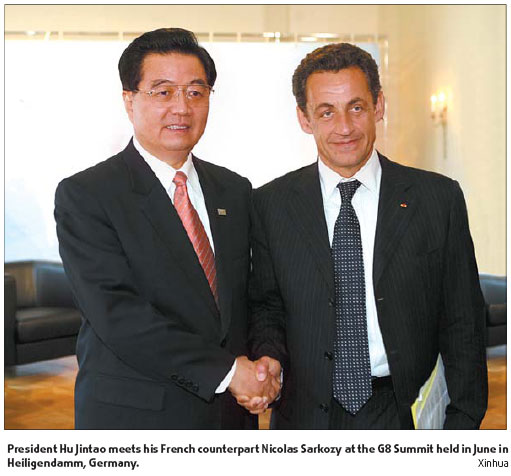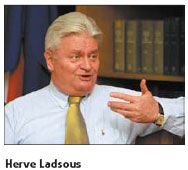Toward new frontiers

French President Nicolas Sarkozy arrived in Beijing yesterday, marking the start of his three-day state visit to China.
China is the first country President Sarkozy visits in Asia after having been elected president of France six months ago, an important signal of the significance France accords to China, said Herve Ladsous, the French ambassador to China.
Meanwhile, President Sarkozy is the first G8 leader to visit China after the recently concluded 17th National Congress of the Communist Party of China
The "very timely" visit is expected to further boost bilateral relations in every field between China and France, added Ambassador Ladsous.

The French ambassador's emphasis on the two "firsts" echoes discussions in the French media about the shift in focus of the new French administration's Asian policy.
China and France, as comprehensive strategic partners, have long been on "intimate" terms with each other, based on identical values, such as multilateralism, and similar positions on international issues, Ladsous said.
The close ties between the two countries have in the late 10 years grown more intense, strongly evidenced by the surge in bilateral trade, which reached $17.51 billion in the first seven months of this year, a jump of 29.7 percent year-on-year. "We are doing well, but we want to do even better," Ladsous said.
Following their first meeting at the G8 Summit held in June in Heiligendamm, Germany, the French President will once again meet President Hu Jintao in Beijing during the ongoing visit.
The two leaders will exchange views on an extensive range of topics included in the "comprehensive strategic partnership" signed between President Chirac and Former Chinese President Jiang Zemin in 1997.
"We currently have talks on all international issues, since China is a major player on international affairs," said the ambassador.
Exploring the possibility of lowering China's import tariffs, a better access to market, and pushing appreciation in the value of the yuan are also on the agenda of the talks between the two leaders, Ambassador Ladsous revealed.
China's favorable balance of trade against France stood at $4.6 billion in the first eight months of this year, a considerable increase compared with the same period last year.
With a depreciating US dollar and firm euro, many French companies are facing financial pressure as they price their goods and calculate sales revenue, including overseas income, in US dollars, and convert the financial results into euros when making them public.
Environmental issues, like climate change - a key part of Sarkozy's election campaign - will be another highlight of the talks between the two leaders, Ladsous said.
"The issues are not directed at any specific party, but for the sake of us all," he said. "We need to think together about what is best for our planet."
Fruitful cooperation
Like previous visiting French Presidents, Sarkozy is also accompanied by a big trade delegation, said Ambassador Ladsous, as promoting economic cooperation remains one of the main focuses of the current French President's mission as well.
A series of agreements, covering energy, transportation and education will be signed during the president's visit.
President Sarkozy will also address a business forum during his stay in China, which aims at "helping French-invested small and medium-sized enterprises (SMEs) to be more active in China and win more opportunities", said Ladsous.
Representatives of 200 French firms and 600 Chinese companies will attend the forum.
"We are glad to have seen excellent progress in bilateral economic cooperation," the ambassador said, though it "maybe not quite enough in terms of direct trade."
At present, France is China's fourth biggest EU trade partner, the third biggest investment source and the second biggest technology exporter to the nation.
So far, 1,800 French companies have established their presence in China, with SEMs accounting for nearly three quarters of that number.
The ambassador referred to the large number of French-invested firms in China to illustrate the boom in the two nations' economic cooperation.
French-invested companies had an annual sales figure of at least 20 billion euros ($29.28 billion) last year, an annual increase of 25 percent, and have employed 250,000 locals.
French firms have a distinct edge in the six sectors of energy, transportation, telecommunication, food, financial services and environment. These are also designated as key cooperation industries between the two nations under an established framework for comprehensive strategic cooperative partners.
While French investors are active players in China, a growing number of Chinese investors have begun to explore their options in France, Ladsous said.
Chinese investment in France focuses mainly on Paris and covers the chemicals, textiles, electrical items, home appliances, air passenger and cargo freight, and micro-electronics sectors.
Local collaboration
Shanghai will be another stop on the French President's tour of China, the ambassador said.
France values exchange at the provincial level between the two nations. "We have developed a close relationship with a number of Chinese cities," the ambassador said.
In addition to Shanghai, Wuhan, Chengdu, Guangzhou and Hong Kong, a new French consulate has also been established recently in Shenyang, capital of Northeast China's Liaoning Province.
It is the first consulate of a Western European country in Northeast China.
"We want to keep up efforts for coordination in the most dynamic areas of China," Ladsous said.
Since his inauguration last December, the ambassador has traveled extensively around China, holding discussions with local governments in a bid to further facilitate cooperation between local authorities of the two countries. At least 70 agreements in this field have so far been signed.
EU summit
As the European Union (EU) chairman nation for the second half of next year, France will continue in its efforts to promote strategic relations and partnership between China and the EU, Ladsous said.
"Asia will be very a strong focus of EU policy during France's presidency next year, and China is a major component," he explained.
EU and China are the first trade partners for each other, said the ambassador. Not just in the economic field, the two global heavyweights need to have in-depth dialogue on a wide range of topics, he added.
"We need to keep working at it, to translate the already close relations to more progress and a genuine strategic partnership."
Following the French President's visit, a China-EU Summit will be held in Beijing on November 28. High-ranking officials from both sides will be present at the meeting, including the President of the European Commission - Jos Manuel Barroso.
With several banking experts in attendance, the topic of currency appreciation is expected to grab the spotlight at the meet.
(China Daily 11/26/2007 page13)














